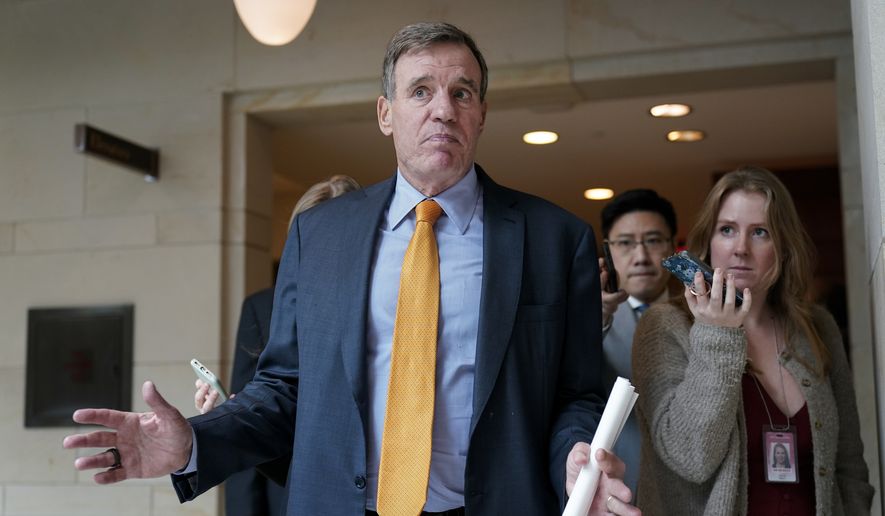Sen. Mark Warner, a member of the Senate Banking Committee who was among several lawmakers to receive campaign contributions from the failed Silicon Valley Bank, downplayed the donations on Monday by saying he was unswayed by them.
The Virginia lawmaker, who was among 17 Senate Democrats in 2018 to vote in favor of a partial rollback of banking regulations under the Dodd-Frank Act passed in the aftermath of the 2008 financial crisis, said he “has never been influenced by campaign contributions on any issue.”
“If there was malfeasance, of course, I’ll return it,” Mr. Warner told reporters at a breakfast hosted by The Christian Science Monitor in Washington. “I’ll give it to charity. But let’s get our facts first.”
Mr. Warner’s campaign has received approximately $27,000 from the failed bank, including $21,600 in donations from the Silicon Valley Bank political action committee and $5,600 in donations from Silicon Valley Bank’s former CEO Greg Becker.
Mr. Warner said on Monday that those contributions go back to around 2014.
The March 10 collapse of Silicon Valley Bank and Signature Bank were the second and third-largest bank failures in U.S. history.
The banks’ troubles have been blamed in part on the Fed Reserve’s rapid series of rate hikes, which reduced the value of their long-term debt. The banks were unable to fulfill the run of withdrawal demands from depositors seeking higher yields elsewhere.
Some, though, also have blamed a rollback of banking regulations under the Trump administration that exempted banks with less than $250 billion in assets from Fed stress tests.
In a letter to Mr. Becker last week, Sen. Elizabeth Warren, Massachusetts Democrat and member of the Senate banking panel, pressed the former CEO on the bank’s lobbying efforts in favor of lighter regulations ahead of the 2018 rollback.
“These rules were designed to safeguard our banking system and economy from the negligence of bank executives like yourself – and their rollback, along with atrocious risk management policies at your bank, have been implicated as chief causes of its failure,” Ms. Warren wrote.
“You have nobody to blame for the failure at your bank but yourself and your fellow executives,” she said. “You lobbied for weaker rules, got what you wanted, and used this opportunity to abdicate your basic responsibilities to your clients and the public – facilitating a near-economic disaster.”
Mr. Warner said he does not regret his vote in 2018 to loosen banking regulations.
“Let me be clear, we need to figure out what happened,” he said on Monday. “And if there were things that happened in 2018 that helped create this crisis, I’m wide open to making changes.”
“If you look at capital requirements, at least all the evidence so far, this was not a case of increased capital requirements would have prohibited this,” he said of the bank failures. “I think this was a liquidity crisis and what I find unconvincing is that some stress test alone would have spotted this. Let’s get the facts before we come up with a solution.”
Just before the bank failures, lawmakers in both parties raised objections to a tentative Fed plan to raise the capital requirements for some banks. Many of those lawmakers have received hundreds of thousands of dollars in campaign donations from the banking industry since 2018.
• Joseph Clark can be reached at jclark@washingtontimes.com.




Please read our comment policy before commenting.